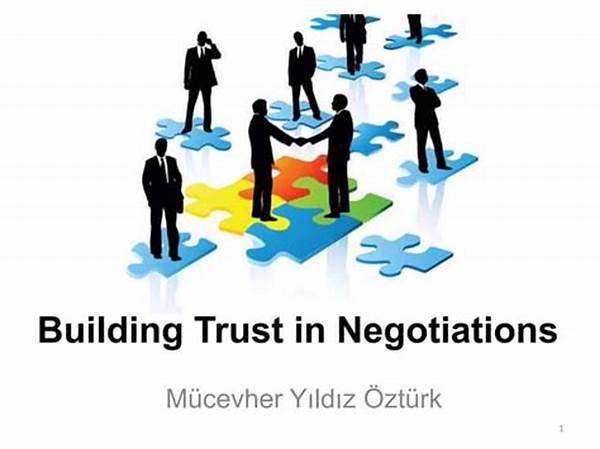The arena of nuclear negotiations is one of the most complex and delicate fields in international diplomacy. With the stakes as high as global security, establishing and maintaining trust among negotiating parties is paramount. The pathway to successful negotiations is paved with transparency, mutual understanding, and consistent engagement. The efforts involved in building trust in nuclear negotiations can be likened to balancing on a tightrope; it requires constant attention and careful maneuvering.
The Foundation of Trust in Diplomatic Discourse
Building trust in nuclear negotiations is fundamentally about creating a platform where all parties feel secure in the commitments they undertake. Establishing trust requires an intricate interplay of transparency and good faith actions. Debates over nuclear capabilities often induce suspicion, thus establishing confidence-building measures becomes indispensable. These measures are not just actions but also pledges that nations adhere to a broader framework of international peace and security. Building trust involves verification mechanisms that are transparent and equitable, providing assurances that each party is acting in accordance with the terms agreed upon. Furthermore, consistent communication and diplomatic engagement reinforce the willingness of parties to adhere to commitments and address concerns constructively. Through such efforts, parties can work towards a common goal where trust acts as both a foundation and a catalyst for effective negotiations.
Challenges in Building Trust
Overcoming historical animosities is pivotal in building trust in nuclear negotiations.
Ensuring verification measures are perceived as neutral fosters trust among negotiating parties.
Acknowledging each nation’s security concerns builds a sense of reassurance during negotiations.
Maintaining consistent dialogue can mitigate misunderstandings and fosters confidence.
Transparently addressing non-compliance issues strengthens the negotiation framework.
Importance of Verification
The role of verification cannot be overstated in the process of building trust in nuclear negotiations. Verification measures serve as the backbone of trust-building efforts, ensuring that all parties adhere to their commitments. The implementation of rigorous inspection protocols and compliance checks allows for a transparent assessment of each nation’s adherence to agreed terms. Building trust in nuclear negotiations, therefore, relies heavily on establishing comprehensive verification processes that are perceived as fair and unbiased by all parties involved. These frameworks not only prevent potential breaches but also provide a mechanism for conflict resolution should disagreements arise. Thus, verification serves as both a preventative and a corrective tool, cementing trust among nations and fostering a stable diplomatic environment where parties can engage in open and honest negotiations.
Strategies for Building Trust
Mutual transparency is critical for building trust in nuclear negotiations by allowing open appraisal of intentions.
Diplomatic channels must remain active to provide continuous communication and mitigate potential mistrust.
Adherence to international arms control agreements can act as a precedent for future negotiations.
Utilizing third-party mediation may offer neutral ground to foster collaboration and mitigate biases.
Adaptable negotiation frameworks ensure flexibility to evolving geopolitical landscapes.
Emphasizing common goals, such as global security, helps unite parties towards a shared agenda.
Building an environment of respect and equality among parties enhances collaborative efforts.
Engagement in regular and structured dialogues can preempt divergence and maintain alignment.
Incorporating cultural sensitivity into discussions acknowledges diverse perspectives and builds inclusivity.
Legitimizing grievances and addressing them transparently contributes to constructive negotiations.
The Role of Diplomatic Engagement
In the arena of nuclear diplomacy, sustained diplomatic engagement emerges as a cornerstone of building trust in nuclear negotiations. It involves active and continual communication between stakeholders, ensuring that open lines exist to address concerns and build rapport. This engagement allows negotiators to move beyond static positions and consider dynamic solutions that foster mutual benefits. Furthermore, diplomatic engagement cultivates an environment where nations can express their security concerns and aspirations freely. By providing a platform for dialogue, diplomatic engagement reduces the potential for escalation and promotes understanding among nations. The emphasis on continuous contact and the reassurance of commitments through diplomatic means underscores the essential nature of engagement in achieving successful negotiation outcomes.
Overcoming Historical Animosities
Addressing historical grievances is an essential aspect of building trust in nuclear negotiations. Historical animosities can hinder progress, as past conflicts and betrayals breed suspicion and resistance. Navigating these historical contexts requires sensitivity and a willingness to acknowledge past issues while focusing on future collaboration. Building trust involves reconciling these histories by introducing frameworks that prioritize mutual recognition and responsibility. This can involve revisiting historical agreements to find common ground and reconciling the narratives that have driven division. Through carefully structured talks and an emphasis on forward-thinking approaches, parties can create an environment conducive to reconciliation and progress. The journey towards building trust is thus both an acknowledgment of history and a commitment to shaping a cooperative future.
Conclusion
In conclusion, building trust in nuclear negotiations stands as a critical element in the broader context of global security. This trust-building process involves a multifaceted approach, including transparency, verification, and sustained diplomatic engagement. Each component serves to solidify commitments and engender confidence among negotiating parties. The complexities of nuclear discussions require diligent attention to fostering a climate of mutual understanding and collaboration, without which the potential for missteps increases drastically. Moreover, historical contexts must be acknowledged, ensuring that past grievances do not overshadow future opportunities for peace. Together, these strategies form the bedrock of successful nuclear negotiations, where trust becomes both the means and the end of diplomatic endeavors. Through a concerted focus on building trust, nations can move towards a more secure and stable world where nuclear capabilities are managed within the bounds of international cooperation and law.





